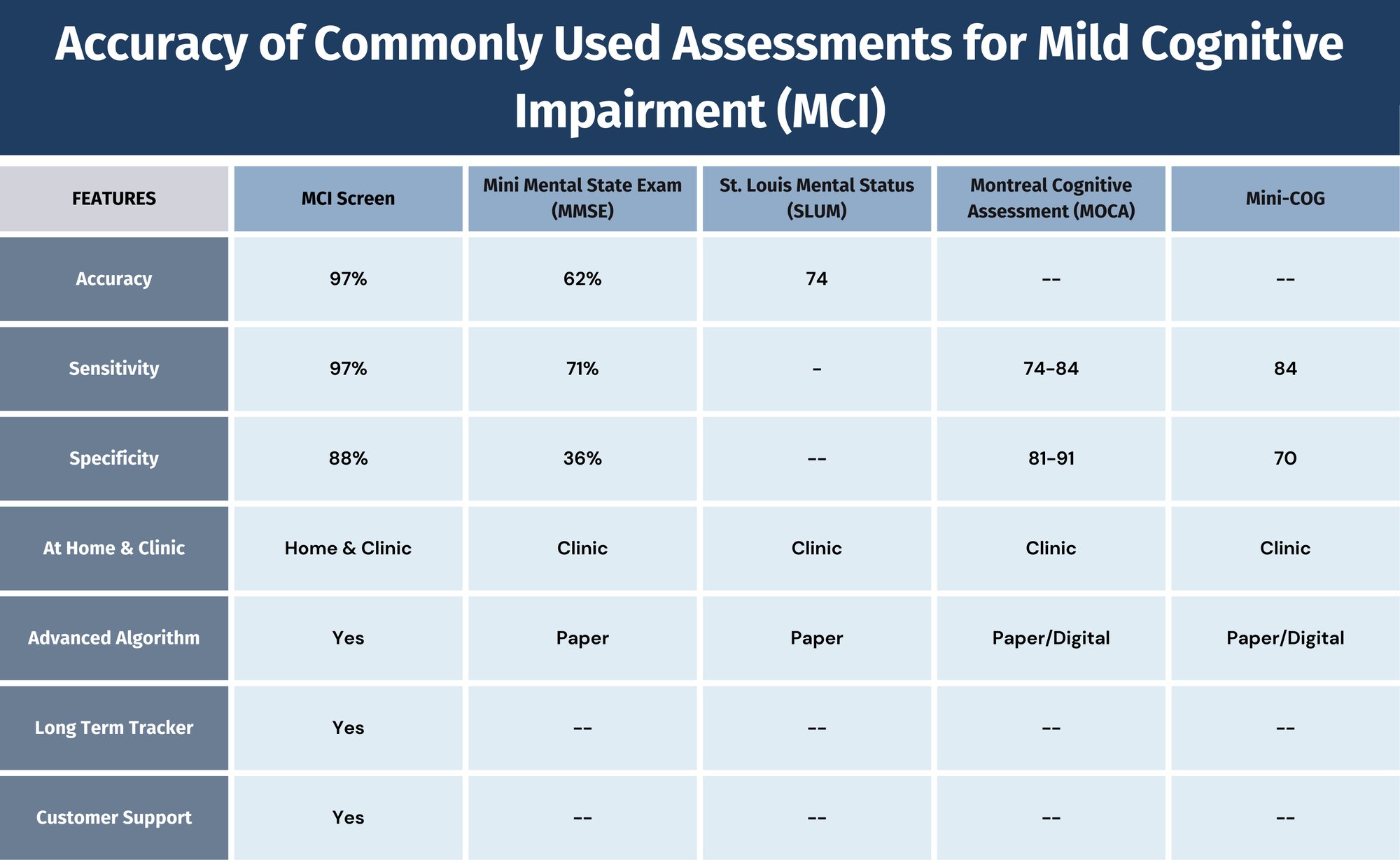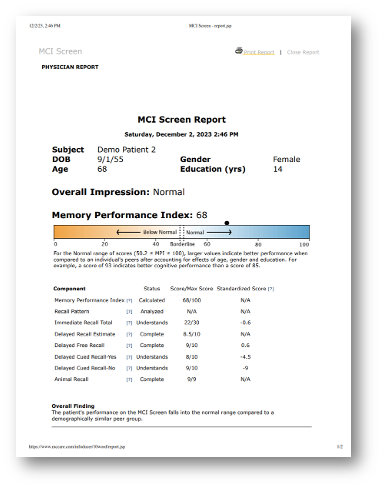Family History of Alzheimer's
If you have a family member with Alzheimer’s, you have witnessed its devastating effects firsthand. Watching a family member or relative suffer from Alzheimer's is difficult and it raises challenging questions.
Three tips: What steps to take if you have a family history of Alzheimer's Disease.
Written by: Home Memory Screen Staff Writers
Last updated: October 21, 2024 - 4 minute read
Background:
Timely Detection of Mild Cognitive Impairment is Important To Initiate Earlier Prevention. Family members ask:
- "Will this happen to me?"
- "What is the state of my “brain health” right now?"
- "How can I detect any meaningful changes as early as possible?"
- "Can I track my brain health over time?"
- "Is there anything I can do to reduce my risk?"
Significant gaps remain in the detection of MCI, especially earlier in the disease when symptoms are subtle and are difficult to distinguish from normal aging.
While no one can know with certainty if you are destined to develop Alzheimer’s, there are ways to know your brain’s current state of cognitive health and take meaningful steps to be proactive in optimizing your brain’s health.

Mild cognitive impairment (MCI) refers to a small but measurable degree of cognitive decline caused by a medical condition. It has the prevalence as high as 42% in population-based studies of primary care practices [Pedersen et al. 2014].
- MCI is not usually detectable by casual conversation or observation, and approximately 60% of persons with MCI are unaware they have a memory problem [Purser et al. 2006]. Persons with MCI perform well-learned skills normally, such as cooking, shopping, paying bills, managing finances or driving, but have trouble incorporating and applying new knowledge.
- Indicators of MCI are difficulty remembering recent conversations or events, keeping track of schedule and appointments, or using new guidelines to manage a business.
Everyone is forgetful now and then. How can we distinguish between what is normal and benign or know when memory and cognitive abilities begin to signal the presence of an underlying medical condition?

Get the Most Accurate Test
The MCI Screen is a cognitive assessment and an appropriate first step in distinguishing normal cognitive abilities from what is not normal. The MCI Screen answers the question: “Is my cognition consistent with normal aging or is my cognition affected by an underlying medical condition, that should be further worked-up by my physician?”
The MCI Screen is *97% accurate in discriminating cognitive changes that are due to normal aging from cognitive changes that are due to an underlying medical condition.
There are two key benefits of precise memory assessment provided by the MCI Screen. The first is to reassure healthy individuals, who are aging normally, that any perceived memory changes are benign. The second is to detect mild cognitive impairment due to an emerging medical condition at its earliest and most treatable stage.
Once Symptoms Present, Time is of the Essence

Learn from our trained assessors
“Helping customers learn if their memory changes are normal for their age is a huge joy for me, and a relief for them.”
Next Steps: Take action to reduce your risk.
Knowing how to mitigate risk and optimize brain health is vital. That is where the Personalized Prevention Report comes in.
The Prevention Report is generated based on information you provide during a guided interview. It identifies your personal risk factors for developing Alzheimer's disease and related disorders. The Prevention Report utilizes evidence-based medicine to recommend the best strategies for your specific risks along with additional general prevention strategies.
Evidence-based medicine (EBM) is the term used to describe the level of research on which the recommendations have been made. The highest level of evidence is characterized by thorough clinical substantiation and the lowest is characterized by scant scientific support. All of the risks and recommendations referenced in your Personalized Prevention Report are based on well-substantiated medical research and high levels of EBM. The level of EBM for each prevention recommendation are clearly listed on your report along with the substantiating medical reference(s).
Your Prevention Report will include detailed strategies and recommendations for supplements, diet, genetic testing, physical exercise, alcohol consumption, depression, diseases, prescription drugs. Over-the-counter drugs, mental stimulation, and vitamins.
Instructions are provided, along with contraindications, adverse effects, drug interactions, and monitoring.
You will know how to optimize brain health and mitigate risk based on the latest medical research and years of clinical practice.
NOTE: you should consult with your physician to ensure the strategies are appropriate for you and there are no interactions with your medical conditions or medications.
Get the most accurate assessment.
MCI Screen answers: Is my memory and thinking normal for my age, or could they be affected by an underlying medical condition?
More about Alzheimer's
- Alzheimer’s is the most common cause of dementia. 6.9 million Americans are estimated to be living with Alzheimer’s dementia, or about 1 in 9 people who are 65 and older.
- Those with a family member or relative affected by Alzheimer’s want to know as early as possible if they are at risk.
- The MCI Screen is 97% accurate in detecting Mild Cognitive Impairment, the earliest detectable stage of cognitive decline.
The Science behind the MCI Screen Report.
The MCI Screen’s high accuracy is achieved by applying sophisticated mathematical scoring methods to the well-validated protocols of the CERAD 10-word recall test and the ADAS-Cog 10-word recall test.
Memory Performance Index" (MPI) is a numeric score showing 50 - 100 for "Normal" and 1 - 50 for "Below Normal" which suggests further clinical evaluation.
MCI Screen is comprised of sub-scores showing memory components that are statistics that can used by patients or clinicians in the diagnostic process.
All assessment results include a clinical discussion guide based on peer-reviewed literature, and a longitudinal view function to compare test results over time.
MCI Screen is not a diagnostic test.

References
- 2005 Shankle MCI Detection Method
- 2007 Trenkle MCIS
- 2008 Cho MCIS
- MCIS Accuracy Validation
